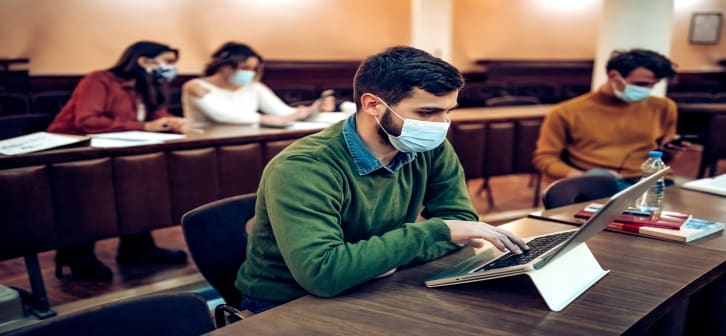New Mask, Booster Mandates Possible As Colleges Prep for Omicron
Writer
Writer

- The omicron variant of the virus that causes COVID-19 is spreading across the country.
- Much remains unknown about the variant, including how easily it spreads or the severity of illness it causes.
- Potential actions colleges could take to stem its spread include mask and vaccine mandates, social distancing.
As the omicron variant of COVID-19 spreads across the U.S., colleges are preparing for potential impacts on student life that could include new mask mandates and social distancing guidelines.
The World Health Organization designated Omicron a "variant of concern" and said that it poses a "very high" global risk. However, there is still little known about how infectious or more severe this strain of COVID-19 is. A recently released preprint study, meaning it has yet to be peer reviewed, found that the variant is almost 2.4 times more likely to reinfect someone who has already had a COVID-19 infection.
With so much about the omicron variant still unknown, experts who spoke with BestColleges were cautious not to make sweeping declarations about how colleges and universities may react to the omicron variant. However, they indicated the tools used to stem the spread of COVID-19 on campuses at the beginning of the pandemic may be put back in play.
"It is still early days of the omicron variant and so we don't know how it will impact colleges," Natalie Dean, an assistant professor in the department of biostatistics and bioinformatics at Emory University, told BestColleges.
“Because of their social nature, outbreaks can take off quickly in colleges”
— Natalie Dean, Emory University Assistant Professor
"Because of their social nature, outbreaks can take off quickly in colleges," she said. "Yet college students themselves remain low risk for severe disease, and while we don't know how omicron will be different, it feels unlikely for it to be dramatically more severe in this age group."
Gerri Taylor, co-chair of the American College Health Association's (ACHA) COVID-19 task force, largely agrees. However, she told BestColleges she believes colleges and universities should still be working now to develop a handful of plans for next semester, each depending on what researchers learn about the new variant.
"I think there is going to be a lot of planning being done over the winter break," she said.
Potential changes could include a return to hybrid or fully online schooling, the reintroduction of mask mandates, new social distancing guidelines and more vaccine mandates. The specific guidelines, however, will largely depend on the qualities of the omicron variant, as well as upticks in COVID-19 cases and hospitalizations near any school, Taylor said.
She added that it'll likely take another two to three weeks for researchers to learn more about the omicron variant, including how severe its symptoms are.
"That said, [school officials] have to have plans with pivot points for when they are going to change gears," Taylor said. It's better to have those plans developed now to make implementation easier, rather than wait until the spring semester.
No major schools have made any sweeping changes in response to omicron just yet, but a few university presidents have expressed concern over the variant.
“We're all on alert”
— Robert Robbins, President of the University of Arizona
"We're all on alert," University of Arizona President Robert Robbins said on Monday, according to the Arizona Daily Star. "It is still early, and scientists around the world are working to study and better understand this new variant. As they do this work, we will monitor public health conditions and adapt as needed."
Northwestern University's vice president for operations Luke Figora said in a statement to the university community that the school is "tracking this one closely," according to the Evanston Now. Figora added that the university will update safety protocols if need be, but in the meantime it recommended all eligible students, faculty, and staff receive a booster shot of the COVID-19 vaccine.
Taylor of ACHA said she anticipates the number of schools requiring both a COVID-19 vaccine and a booster will likely increase as a response to this variant over the coming months.
BestColleges has identified over 1,000 U.S. schools with a vaccine mandate, as of late November.
Latest News
Related Stories
Featured Stories
Latest Analysis
College Accreditation Is Changing. Here’s What Students Need To Know.

11 Red States Are Suing to Block Biden's SAVE Loan Repayment Plan. Here's What Borrowers Need to Know.

Here's Where the 2024 Presidential Candidates Stand on Higher Education

College Admissions, Student Diversity, and Campus Culture 50 Years Ago












